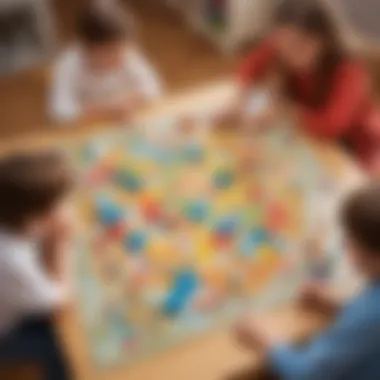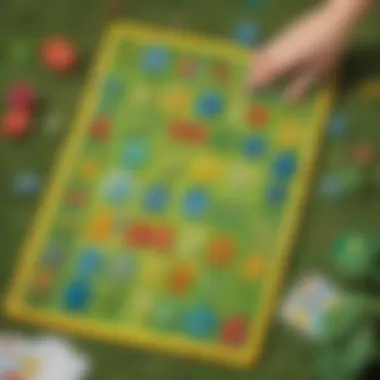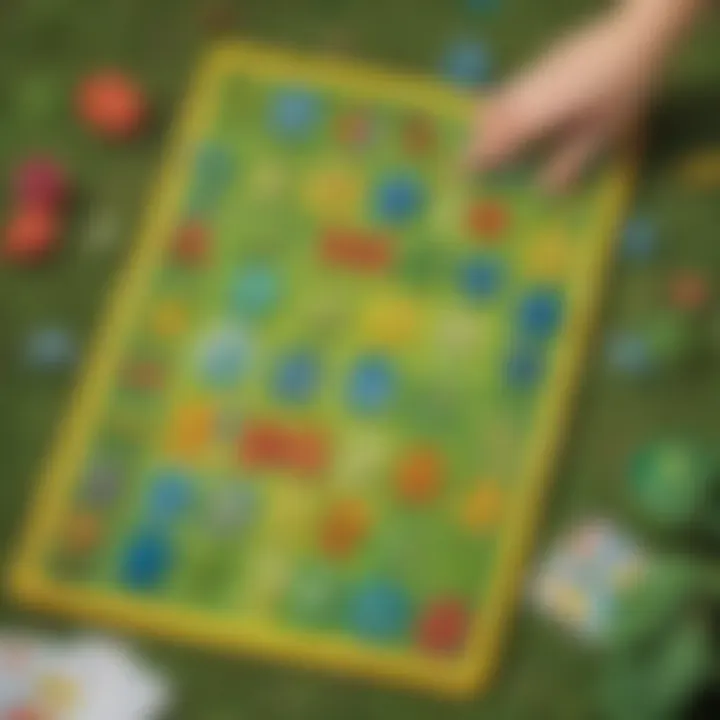Engaging Maths Games for Nine-Year-Olds: A Guide to Learning Through Play


Intro
In today’s educational landscape, the importance of engaging methods for teaching mathematics to children is more crucial than ever. Nine-year-olds, in particular, are at a stage where learning should be both fun and effective. This article delves into various maths games that not only entertain but also serve to enhance mathematical skills. By focusing on game-based learning, we can reduce the anxiety often associated with maths while simultaneously improving cognitive abilities.
Understanding how to incorporate play into learning helps parents and educators make maths more approachable for young learners. Moreover, games encourage collaboration and teamwork, fostering a positive and interactive learning environment. Each section of this guide will address different aspects of engaging maths games, highlighting their educational value and strategies for use at home or in classrooms.
Prelude to Maths Games
The exploration of maths games provides an essential foundation for young learners. This section highlights the significance of engaging in mathematical activities that feel less like traditional learning and more like playful experiences. Nine-year-olds are at a stage where curiosity is high. They wish to engage and discover. Incorporating games into their activities not only captures their interest but also enhances their ability to grasp complex concepts. The main goal is to make mathematics approachable, enjoyable, and applicable to real-world scenarios.
Purpose of Maths Games
The primary purpose of maths games is to foster an engaging environment that stimulates learning. These games serve several functions:
- Encouraging Exploration: Maths games provide a platform for students to explore concepts freely. They allow children to experiment with numbers and operations without the pressure of formal assessments.
- Creating an Interactive Experience: Rather than passively receiving information, children actively participate in their learning journey. Games encourage action and involvement, which leads to better retention of mathematical concepts.
- Bridging Theory with Practice: In games, mathematical theories are often applied in practical, real-life contexts. This connection helps children understand why math is important and applicable outside of the classroom.
Benefits of Game-Based Learning
There are numerous benefits associated with game-based learning, particularly for nine-year-olds. Some important aspects include:
- Enhanced Motivation: Games can significantly increase motivation levels among children. The element of play makes math less intimidating and more relatable, leading to a positive attitude towards the subject.
- Improved Problem-Solving Skills: Engaging in maths games encourages critical thinking and problem-solving. Children learn to strategize, anticipate outcomes, and think numerically as they tackle different challenges.
- Development of Social Skills: Many maths games are designed for multiple players, which promotes collaboration and communication. Through these interactions, children learn to work as a team, share ideas, and resolve conflicts.
"Engaging in playful activities is a powerful way to impart essential math skills while developing cognitive abilities in young minds."
- Adaptability to Different Learning Styles: Maths games can be tailored for various learning styles—visual, auditory, or kinesthetic. This flexibility means that every child can engage with the content in a way that resonates with them, enhancing overall comprehension.
- Long-Term Retention: Learning through play can lead to better long-term retention of mathematical concepts. The fun and enjoyment associated with gaming often result in memories that last, giving children a solid foundation for future learning.
By understanding the purpose and benefits of maths games, parents and educators can more effectively incorporate this approach into learning environments, thereby enriching the educational experiences of nine-year-olds.
Types of Maths Games
Understanding the different types of maths games is essential for fostering an engaging and effective learning environment for nine-year-olds. Each type serves unique purposes and appeals to various interests, thus accommodating diverse learning styles. The integration of games into the educational process not only makes learning enjoyable but enhances comprehension and retention of mathematical concepts. It is crucial to recognize each category's potential and select games that align with both educational goals and children's preferences.
Board Games
Board games have long been a staple in family entertainment and learning. They encourage face-to-face interaction among players, which can be beneficial for social development. Games such as Sum Swamp or Math Dice teach addition, subtraction, and problem-solving skills through engaging gameplay. They often require players to use strategic thinking and planning, thus enhancing critical cognitive skills. The tactile experience of handling cards and moving pieces can also aid in memory retention.
When selecting board games, consider those that include mathematical elements but also allow for creativity and collaboration. This ensures children engage deeply rather than just rote memorization of facts.
Card Games
Card games can be incredibly versatile and adaptive. Simple games like Uno can be modified to include maths operations while playing. For instance, requiring players to calculate points or apply number operations can deepen their understanding of concepts like addition and subtraction. Flashcards may also function effectively, allowing children to quiz each other on math facts in a game format.
The casual nature of card games makes learning less pressure-filled. Children can learn while enjoying the game, often forgetting that they are practicing maths. The variety of card games available means numerous opportunities for parents and educators to incorporate math learning seamlessly into play.
Online Maths Games
The role of technology in children's education cannot be overstated. Online maths games provide interactive experiences that can engage children beyond traditional learning methods. Websites like Cool Math Games or Prodigy Math offer a range of activities that are both educational and entertaining. These platforms often include elements of competition, which can motivate children to improve their skills.
Online games can also adapt to various skill levels, ensuring that children are neither overwhelmed nor bored. Many of these games feature a reward system which can incentivize continued engagement. However, while online games are beneficial, it's important to balance screen time with other interactive forms of learning.
Physical Games
Integrating movement into learning is another effective method for teaching maths. Physical games that require counting steps, adding points, or using number lines can make learning dynamic. For instance, a Math Relay Race can involve solving math problems to move from one position to another. This not only integrates physical activity but also emphasizes teamwork and collaboration.


Additionally, simple activities, such as Jumping Jacks while counting to ten or practicing multiplication facts, can also create a fun atmosphere. Staying active keeps children engaged and helps in solidifying their knowledge through movement and physical interaction.
Each type of maths game contributes uniquely to a child's educational experience. The key is to find the right mix that fosters learning while keeping the process enjoyable. By leveraging these different game types, parents and educators can create an enriching environment that boosts children's interest and proficiency in maths.
Key Skills Enhanced by Maths Games
Maths games are much more than just a source of entertainment; they serve as powerful tools for developing essential skills in children. The integration of engaging activities with learning principles can transform how young learners approach mathematics. This section focuses on three significant areas: problem-solving skills, critical thinking, and collaboration and teamwork. Each of these skills plays a vital role in holistic development and academic success.
Problem-Solving Skills
Problem-solving is a core component of mathematics. Engaging with maths games allows nine-year-olds to face various challenges in a low-pressure setting. These games encourage children to think through problems step by step. For instance, in games like Math Jeopardy, players must analyze questions and determine the best strategies for answering them.
By fostering problem-solving skills, children learn to approach challenges logically. The experience helps them understand not only how to get an answer but also how to break down complex problems into manageable parts. This is crucial in both academic settings and everyday life. Engaging in gameplay cultivates resilience as children experience and learn from failure, fostering a growth mindset.
Critical Thinking
Critical thinking is another skill that maths games significantly enhance. Through analysis and interpretation of information, children develop the ability to evaluate various factors influencing their decisions. Games such as Number Bingo compel players to think critically about numbers and patterns. Children must assess their options and strategize the best moves to succeed.
This skill transcends mathematical understanding; critical thinking promotes better decision-making in various segments of life. As young learners engage with maths games, they begin to question processes, consider alternative solutions, and draw conclusions based on evidence. This analytical mindset is indispensable for future academic and career success.
Collaboration and Teamwork
In today's interconnected world, collaboration is crucial. Maths games often involve multiple players, promoting teamwork and social interaction. Taking part in collaborative games teaches children how to communicate effectively, share ideas, and appreciate different perspectives. Games like Math Scavenger Hunt not only make learning fun but also foster camaraderie among players.
Working as a team allows children to combine their strengths, leading to a deeper understanding of mathematical concepts. It encourages negotiation and respect for others’ contributions. These experiences become foundational as they navigate group dynamics in future educational and social settings. Collaboration nurtures a sense of belonging, which can enhance motivation for learning.
"By integrating maths games into playtime, we equip students with skills that extend beyond the classroom, preparing them for lifelong learning and teamwork."
In summary, maths games are a vital resource for developing key skills in young learners. By focusing on problem-solving, critical thinking, and collaboration, these games create an enriched learning environment conducive to both academic achievement and personal growth.
Examples of Fun Maths Games
When it comes to engaging nine-year-olds in mathematics, incorporating games into the learning process is crucial. Fun maths games not only facilitate the understanding of mathematical concepts but also make learning enjoyable. In this section, we will explore various examples of fun maths games that can enhance both problem-solving skills and critical thinking in a playful and interactive manner. These games encourage children to interact with numbers, apply strategies, and collaborate with peers or family members. And importantly, they help to alleviate the often intimidating nature of math, turning it into an exciting adventure.
Number Bingo
Number Bingo is a classic game that can be easily adapted for various mathematical challenges. Players mark numbers on their cards based on calls made by a leader who selects random numbers. This game can be tailored to focus on different skills, such as addition, subtraction, or even multiplication. For instance, instead of calling out the numbers directly, the leader can call out basic math problems, and players must solve them to find the corresponding number on their card.
- Benefits of Number Bingo
- Enhances number recognition.
- Reinforces mental math skills through quick calculations.
- Encourages focused listening and attention.
- Can be played in groups, promoting social interaction.
Math Jeopardy
Math Jeopardy combines knowledge with a competitive edge, making it a useful tool for learning. Players can form teams and choose questions from different categories, each with varying point values. The questions can encompass topics such as geometry, fractions, or word problems. This game encourages teamwork and helps players think critically to select the best potential answers quickly.
- Why Math Jeopardy is beneficial:
- Encourages teamwork and collaborative learning.
- Motivates learners through competitive gameplay.
- Provides a range of math concepts at varying difficulty levels.
- Enhances quick thinking and response skills under pressure.
Math Scavenger Hunt
A Math Scavenger Hunt involves players searching for items that meet specific math criteria. For instance, you might ask children to find items that represent a particular shape or items for counting. This game encourages movement and exploration while integrating real-world math applications. Additionally, players can engage in simple math problems related to the found items.
- Key components of a Math Scavenger Hunt:


- Blends physical activity with math learning.
- Promotes critical thinking in identifying items.
- Encourages creativity in problem-solving.
- Adaptable for different mathematical concepts by changing criteria.
Card Game Variation: War
The card game War can be adapted to enhance math skills effectively. Players compare the values of cards thrown down, but instead of just focusing on greater or lesser values, players can also incorporate addition or subtraction to calculate the total of their cards. This variation allows for multiple mathematical operations, providing a solid review of basic math principles while playing with family or friends.
- Advantages of Card Game Variation: War:
- Enhances understanding of numerical values and operations.
- Boosts strategic thinking in gameplay.
- Involves both fun and learning through a familiar game format.
- Fosters friendly competition, making math less intimidating.
In summary, these fun maths games blend learning with play, engaged children in active thinking while reinforcing key mathematical skills. Game-based learning is powerful, and these examples will enable parents and educators to foster a lasting enthusiasm for mathematics.
Implementing Maths Games at Home
In the context of fostering a love for mathematics among children, implementing maths games at home is crucial. Families can create a rich educational experience that extends beyond the classroom. Using games to teach maths not only enhances understanding of mathematical concepts but also turns learning into an enjoyable family activity. When children engage with maths in a playful manner, they are more likely to develop a positive attitude toward the subject.
Creating a Learning Environment
A conducive learning environment is fundamental when engaging children in maths games. This space should be quiet and free from distractions. Ideally, it needs to be inviting and cozy, promoting focus and creativity. Ensure that the necessary materials, like games, writing tools, and a whiteboard, are easily accessible. Having a dedicated area for learning can psychologically prime the child to associate that space with productive activities. Consider personalizing the space with educational posters or their previous works to foster pride and ownership in their learning journey.
Choosing Appropriate Games
Selecting the right games is vital for maximizing educational value. Choose games that are age-appropriate and align with their current learning needs. Consider classics like "Monopoly," which enhances number skills and financial literacy, or specific maths-focused games such as "Math Dice". Make sure the games challenge but do not frustrate the child. Look for games that incorporate various maths aspects, such as addition, subtraction, and basic geometry. Additionally, check for multi-player options to promote social interaction while learning.
Involving Family Members
Family involvement can greatly enhance the experience of playing maths games at home. Invite siblings, parents, or extended family to join in. This approach can help build teamwork and collaboration among family members. Creating a routine game night can develop anticipation and consistency. It is vital for parents to actively participate and guide children as needed, but also allow for independence in their problem-solving. Encourage discussions around strategies used in the game to deepen understanding and sharing of ideas.
Collaborative play not only supports the child's maths skills but also strengthens family bonds.
By implementing these strategies at home, families can effectively integrate maths learning into everyday life. This approach lays a solid foundation for the child’s future educational pursuits.
Adapting Games for Different Learning Styles
Adapting games to fit various learning styles is essential in making mathematics accessible and enjoyable for nine-year-olds. Children often have unique ways of absorbing information. Recognizing and addressing these differences can enhance their learning experience. By tailoring games to suit visual, auditory, and kinesthetic learners, parents and educators can create environments where every child feels included and encouraged to participate.
Different learning preferences influence how children grasp concepts and solve problems. Game-based learning can both accommodate these styles and foster a love for mathematics. This adaptability encourages personal engagement, leading to a deeper understanding of mathematical ideas.
Visual Learners
Visual learners process information better when it is presented through images, diagrams, and written instructions. Games that incorporate visual elements can significantly enhance their learning experience. For example, using colorful charts or infographics related to a maths game helps connect the game to the concepts being taught.
- Use Clear Graphics: Resources like flashcards can be used in games to represent numbers or equations.
- Incorporate Visual Aids: Visual aids like graphing calculators or interactive whiteboards can make problems more tangible.
- Leverage a Color Code: Using different colors for various mathematical operations can help these learners recognize patterns.
Auditory Learners
Auditory learners benefit more from listening and verbal engagement. They grasp concepts through spoken words, songs, or discussions. To facilitate their learning through games:
- Encourage Discussions: Implement games where players read aloud the problem aloud or discuss strategies before making moves.
- Use Rhymes or Songs: Create or use existing songs that incorporate mathematical concepts. This technique makes it easier for auditory learners to remember rules and numbers.
- Incorporate Technology: Online maths games often include audio instructions, which can enhance the learning experience.
Kinesthetic Learners
Kinesthetic learners thrive through movement and hands-on experiences. Games tailored to their style can turn learning into an adventure. Here are some effective strategies:
- Utilize Manipulatives: Use small objects like blocks to help illustrate mathematical concepts during play.
- Incorporate Movement: Games that require players to move around, such as scavenger hunts that involve solving maths problems, engage these learners physically.
- Create Interactive Stations: Set up different stations where children can perform activities related to various mathematical operations, allowing them to learn through action.


By addressing the distinct preferences of visual, auditory, and kinesthetic learners, parents and educators can make maths games more effective and enjoyable. Such thoughtful adaptation provides a more comprehensive approach to learning, ultimately fostering a positive attitude toward mathematics.
The Role of Technology in Math Games
Technology plays an essential role in transforming traditional math games into dynamic learning experiences. For children around nine years old, engaging with mathematical concepts through digital platforms can greatly enhance their understanding. Such integration provides immediate feedback, interactive elements, and varied formats that cater to different learning preferences. This section will examine how educational apps and interactive websites can make math learning enjoyable and effective.
Utilizing Educational Apps
Educational apps have gained popularity due to their accessibility and ease of use. Many apps focus on specific math skills or concepts, allowing children to practice in an engaging way. These apps often feature interactive puzzles, quizzes, and challenges that reinforce mathematical principles without pressure.
Some key benefits of using educational apps include:
- Instant Feedback: Children can see their performance and understand mistakes right away.
- Gamification: Many apps incorporate game-like elements, such as rewards and levels, which motivate learners.
- Personalization: Apps often adapt to a child's learning pace, ensuring they grasp concepts thoroughly before moving on.
When selecting an educational app, consider options like Khan Academy Kids or Prodigy Math, which offer substantial content and cater to diverse learning styles.
Interactive Websites for Mathematics
Interactive websites serve as another resource that complements traditional learning. These platforms provide a variety of problems and challenges that can be tackled individually or collaboratively. They help cultivate critical thinking and problem-solving skills while making math engaging.
Useful features of interactive websites include:
- Varied Content: Websites like IXL and Coolmath Games offer diverse math challenges covering numerous topics.
- Collaborative Learning: Many sites promote team activities, allowing children to work with peers, fostering teamwork.
- Progress Tracking: Users can typically track their progress over time, helping them stay motivated.
Incorporating technology through educational apps and interactive websites makes math learning more accessible for young learners. This approach not only addresses different learning styles but also makes the subject feel less intimidating. Thus, integrating technology can be seen as a comprehensive strategy for enhancing math education.
Encouraging a Growth Mindset
Encouraging a growth mindset is essential when introducing maths games to nine-year-olds. This mindset helps children understand that abilities can be developed through hard work, effective strategies, and input from others. In the context of maths games, fostering this mindset enables children to view challenges as opportunities for learning rather than as obstacles. When they engage with maths through play, they are more likely to take risks and make mistakes, seeing these as part of the process, not faillures.
Fostering Resilience
Fostering resilience in young learners can be effectively achieved through maths games. Resilience is the ability to bounce back from setbacks and try again. When children play games that require mathematical thinking, they may face challenges that push their boundaries. For example, if a child loses a round in a maths game, instead of feeling defeated, they learn to analyze what went wrong. They begin to appreciate that struggle is often part of the journey towards mastery. This lesson can be valuable beyond maths, helping children become more adaptable in various situations throughout their lives.
Emphasizing Process Over Results
Emphasizing the learning process rather than just the final outcomes is crucial when teaching maths through play. This shift in focus helps children understand that the journey of learning holds significant value. In maths games, children engage with problems, explore different solutions, and discuss strategies with peers. By rewarding effort, strategy, and creativity, rather than simply correct answers, children gain intrinsic motivation. This promotes continued participation in learning activities and helps maintain interest in mathematics.
"The journey is just as important as the destination."
In practice, educators and parents can guide children to discuss what they learned from each game session, encouraging reflection. They can ask questions such as, "What strategies worked well for you?" or "What would you do differently next time?" This creates an environment where learning becomes a continuous process.
Incorporating these principles of growth mindset into maths games will help children not only excel in mathematics but also develop essential life skills.
Culmination
In this article, we emphasized the significance of engaging maths games for nine-year-olds. These activities provide not only an avenue for learning mathematical concepts but also enhance critical skills needed for overall development. Game-based learning encourages active participation, making mathematics feel less intimidating. When children engage in these games, they develop their problem-solving abilities, critical thinking, and even social skills through collaboration with peers or family members.
Summarizing Key Points
- Importance of Learning Through Play: Engaging kids in maths games transforms abstract concepts into tangible experiences.
- Variety of Games: A diverse range of games exists, from board games to online platforms, catering to various preferences and learning styles.
- Carving Unique Learning Paths: Adapting these games allows educators and parents to cater to individual learning styles, ensuring that each child can thrive.
- Promotion of Growth Mindset: By emphasizing resilience and the learning process, games foster an environment where children feel safe to make mistakes and learn from them.
"Games not only entertain but also educate. In the right context, they can reshape a child’s relationship with mathematics."
Unlocking the potential of maths games goes beyond making learning enjoyable; it also equips children with necessary life skills. Parents and educators must remain aware of the diverse dimensions of learning that these games touch upon.
Future Implications for Maths Education
Looking ahead, the integration of game-based learning into maths education could profoundly shift teaching methodologies. As technology continues to evolve, interactive games and apps will likely become more prevalent. This may lead to:
- Increased Engagement: Technology-driven games can captivate attention more than traditional methods, creating a more engaging experience for children.
- Personalized Learning Experiences: Future educational practices may see more tailored lessons, based on the data collected through gameplay to address specific children’s needs.
- Greater Emphasis on Collaboration: Relationship-building through cooperative games can foster teamwork skills, vital for future education and employment.







